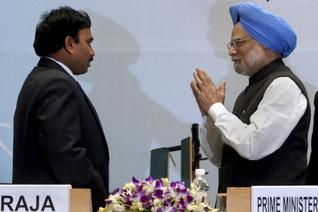 New Delhi, April 23: In his 112-page written statement to the Joint Parliamentary Committee (JPC) probing the 2G scam, the former Telecom Minister and prime accused, A. Raja, has said he personally met Prime Minister Manmohan Singh severalspectrum allocation times between November 2007 and July 2008 — the period when the scam was perpetrated — to keep him informed of all 2G-related decisions, and the Prime Minister agreed with him.
New Delhi, April 23: In his 112-page written statement to the Joint Parliamentary Committee (JPC) probing the 2G scam, the former Telecom Minister and prime accused, A. Raja, has said he personally met Prime Minister Manmohan Singh severalspectrum allocation times between November 2007 and July 2008 — the period when the scam was perpetrated — to keep him informed of all 2G-related decisions, and the Prime Minister agreed with him.
On Page 72, while challenging the JPC’s draft report and the CBI’s allegations that Mr. Raja had “misled” the Prime Minister, he says: “This allegation has been made by the CBI without even recording the statement of the Hon’ble PM. On what basis do they say he was misled? I hope the JPC will not commit the same blunder; if they wish to draw any conclusion on this issue, it is mandatory to record my statement and the statement of the Hon’ble PM.” But the draft report has already reached that conclusion.
Mr. Raja then goes on to give details of his meetings, letters and conversations with the Prime Minister, several of which are not in the public domain.
Mr. Raja claims that apart from seven letters between November 2, 2007, and July 2, 2010, “I had several personal discussions with the Hon’ble PM on telecom issues throughout my tenure and particularly in the period from November 2007–January 2008.” He further provides occasions and venues where such meetings took place. “These would happen on the side of Cabinet meetings or separately at his office/residence.”
The Prime Minister has made specific statements on his discussions with Mr. Raja at a TV Editors press conference and in Parliament in February 2011, but has not disclosed either the occurrence or the details of these meetings, save one held among Mr. Raja, Mr. Chidambaram, and himself on July 4, 2008, seven months after the scam broke out.
Met PM a week before scam
Mr. Raja says that after his December 26, 2007 letter, which detailed the change in the first-come first-served (FCFS) policy, “I met the Hon’ble PM in the first week of January 2008, and this issue was again discussed, and he agreed with the proposed course of action of the DoT.” If correct, the meeting would have occurred within a week prior to the award of Letters of Intent for 2G licences on January 10, 2008, and supports documents that show that on the Prime Minister’s request of December 29, 2007, Pulok Chatterji, Secretary, and T.K.A. Nair, Principal Secretary to the Prime Minister, had discussed and endorsed Mr. Raja’s modification of the FCFS policy in PMO files through notings on 1, 6 and 7, January 2008. This was highlighted in a news report, ‘New papers show PMO analysed and agreed with Raja’s actions before 2G scam,’ published in The Hindu on March 18, 2013.
Continuing with his attack on the contention that the Prime Minister was misled, Mr. Raja says: “DoT officers were in touch with PMO regularly, without even involving me, as seen by the file notings of the PMO itself.” On July 24, 2012, CBI officials deposed before the JPC that they had not gone through the PMO files. The CBI stated that it approached a “Section Officer” in the PMO to check the “authenticity” of certain documents.
In the statement, Mr. Raja details instances and the importance of his face-to-face meetings with the Prime Minister and the then Law Minister, H.R. Bhardwaj, whose advice to take the 2G spectrum issue to the Empowered Group of Ministers (eGoM), had been rejected by Mr. Raja as “totally out of context.”
Citing “several interactions” he had with the Prime Minister and the Law Minister, he says: “If either of them had desired that the eGoM should consider this matter, they would have told me and I would have acted accordingly. However, neither of them ever made this suggestion, and rather they fully understood and endorsed my course of action.”
Pointing to his re-appointment as Telecom Minister after the 2009 election, Mr. Raja says: “…surely if he [the Prime Minister] felt that I misled him or offended him in any manner, my appointment would not have happened.”






Comments
Add new comment